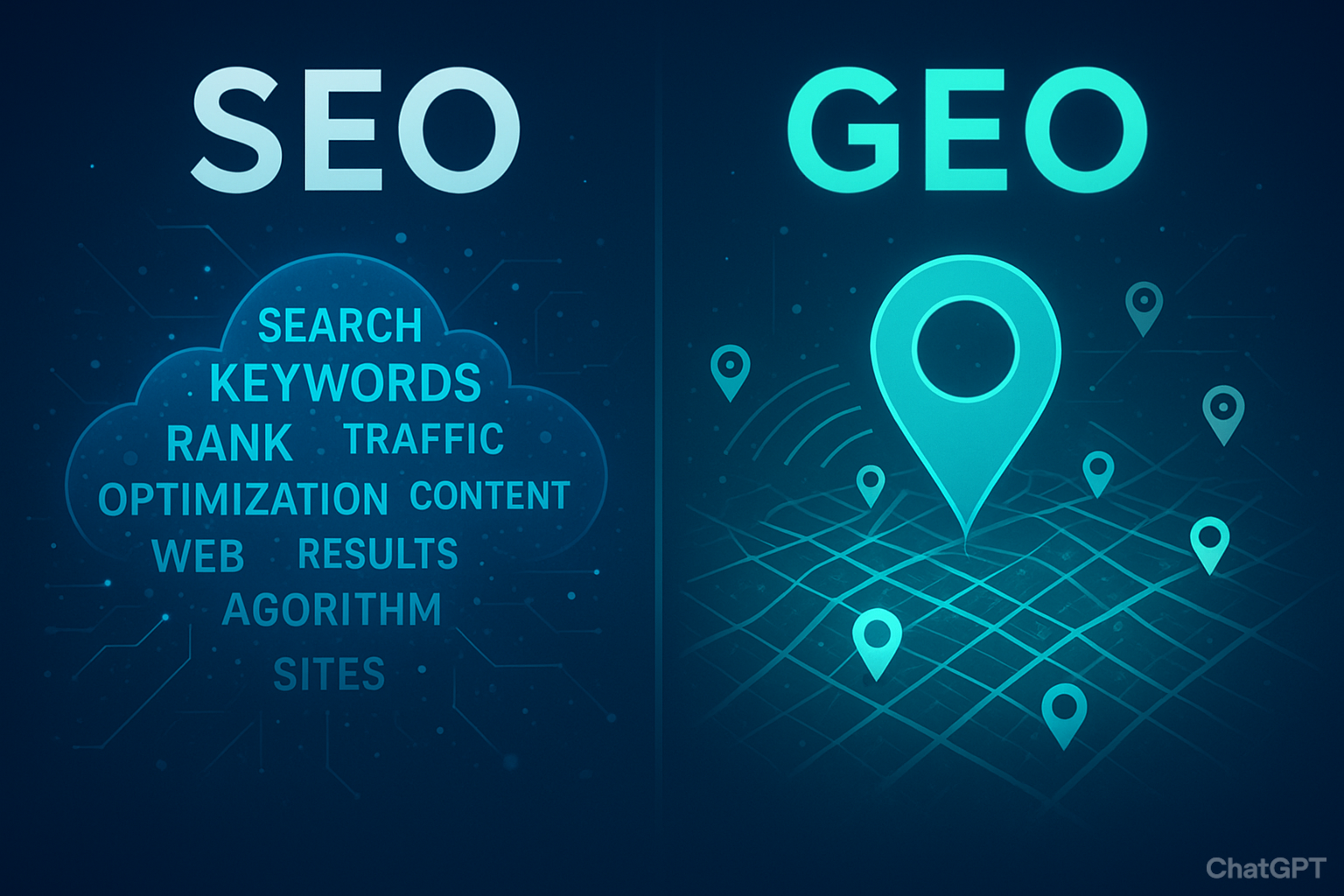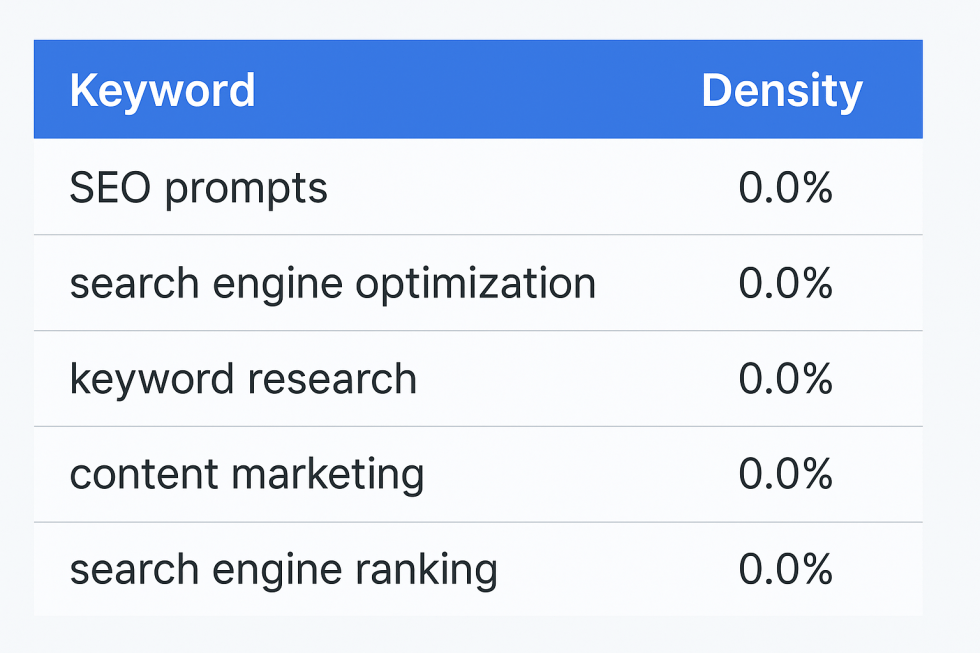
The digital world has long been obsessed with [SEO (Search Engine Optimization)**]( https://bkthemes.design/seo/). Not one word was whispered about GEO. For years, the formula was simple: rank higher in search results, attract more clicks, win more customers. But the digital landscape is shifting fast. With [AI](https://ericmalley.com)-driven personalization, location-aware devices, and hyper-local customer expectations, the old SEO playbook is losing its grip.
The future isn’t about keywords alone—it’s about Geo**. Businesses that understand how to connect with people where they are, when they need it, and within their cultural and geographical context** will thrive. Let’s dive into why “Forget SEO, We Need to Be Geo” isn’t just a catchy phrase, but a roadmap for the future.
The Problem with Traditional SEO
[SEO](https://bkthemes.design/blog/10-seo-mistakes-designers-still-make-in-late-2025/) has always been about visibility in the digital crowd. You craft the perfect blog post, optimize your titles, sprinkle in the right keywords, and hope Google blesses you with a higher ranking.
But here’s the issue:
-
Everyone is chasing the same keywords.
Search results are increasingly dominated by ads and AI-generated summaries.
Customers don’t just want “answers”—they want relevant, local, and immediate solutions**.
Imagine someone searching for “best coffee shop.” Do they want a blog post ranking globally for that keyword? No—they want the closest, [best coffee shop](https://dutchbros.com) within walking distance**.
Enter the Age of “Geo”
Geo is about contextual discovery**. It’s not just about being seen; it’s about being found in the right place at the right time**.
-
Hyperlocal Optimization** → Businesses aligning their digital presence with local maps, reviews, and even neighborhood slang.
Geo-Fencing & Targeting** → Ads that activate when a customer enters a specific zone.
Cultural Relevance** → A pizza shop in New York might highlight “dollar slices,” while one in Naples emphasizes heritage and tradition.
Real-Time Discovery** → Voice search, wearables, and AR glasses pointing people to what’s nearby, not just what’s popular online.
In short: Geo connects digital visibility** with physical presence**.
Why “Geo” Matters More Than Ever
-
AI + Personalization**
With AI curating search results, relevance isn’t just about keywords—it’s about knowing a user’s preferences, habits, and location.
Local Trust**
Customers trust businesses with local reviews, familiar branding, and a visible footprint in their area.
The Mobile First World**
Over 60% of searches now happen on mobile, where location-based results take priority.
The Rise of “Near Me” Searches**
Queries like “restaurants near me” or “open now” have exploded, signaling a shift from information search** to instant decision-making**.
From SEO to GEO: A New Framework
Here’s how the shift looks:
Old SEO Mindset** New GEO Mindset** Keywords matter most Location & context matter most Compete globally Dominate locally Rankings drive traffic Maps, reviews, and presence drive trust Content is static Content is dynamic & contextual Visibility is digital Visibility is digital + physical
A Futuristic Vision: Living in a Geo-First World
Picture this: You’re walking through a new city. Instead of Googling “best lunch spots,” your AR glasses highlight the three most popular restaurants within 500 meters, showing live wait times, local reviews, and even recommending dishes based on your dietary preferences.
In this world, businesses don’t just optimize for search engines—they optimize for streets, communities, and real-time experiences**.
The Takeaway
SEO isn’t dead—but it’s no longer enough. In a world where proximity, context, and relevance** define customer choices, businesses must pivot from chasing algorithms to anchoring themselves in place**.
The winners won’t just be those who rank higher online. They’ll be the ones who can say:
-
“I’m here.”
“I’m local.”
“I’m relevant right now.”
Frequently Asked Questions
{{< faq title="What does "Be Geo" mean in digital marketing?" >}}
"Be Geo" refers to shifting focus from traditional SEO (keyword-driven optimization) to geolocation-based strategies. It emphasizes connecting with customers based on their location, context, and cultural relevance rather than just ranking higher on search engines.
{{< /faq >}}
{{< faq title="Why are "near me" searches so important?" >}}
"Near me" searches reflect immediate intentcustomers aren't just browsing; they're ready to act. Ranking for "best pizza near me" or "pharmacy open now" can directly translate into foot traffic and sales.
{{< /faq >}}
Conclusion: The Future Belongs to Geo
For decades, businesses have played the SEO game, climbing search rankings with keywords, backlinks, and content strategies. But the world has changed. Customers aren't just searching anymorethey're discovering, deciding, and acting in real time, often within walking distance of where they stand.
This is where Geo takes the lead. It bridges the gap between the digital and physical worlds, ensuring businesses are not just visible, but also present, trusted, and relevant in the exact moment a customer needs them.
The companies that embrace Geo today will be the pioneers of tomorrow's marketplacewhere personalization, proximity, and authenticity matter more than sheer visibility.
So while SEO will always have its place, the real winners will be those who dare to say:
Forget SEO. We need to be Geo.
Everyone is chasing the same keywords.
Search results are increasingly dominated by ads and AI-generated summaries.
Customers don’t just want “answers”—they want relevant, local, and immediate solutions**.
Imagine someone searching for “best coffee shop.” Do they want a blog post ranking globally for that keyword? No—they want the closest, [best coffee shop](https://dutchbros.com) within walking distance**.
Enter the Age of “Geo”
Geo is about contextual discovery**. It’s not just about being seen; it’s about being found in the right place at the right time**.
-
Hyperlocal Optimization** → Businesses aligning their digital presence with local maps, reviews, and even neighborhood slang.
Geo-Fencing & Targeting** → Ads that activate when a customer enters a specific zone.
Cultural Relevance** → A pizza shop in New York might highlight “dollar slices,” while one in Naples emphasizes heritage and tradition.
Real-Time Discovery** → Voice search, wearables, and AR glasses pointing people to what’s nearby, not just what’s popular online.
In short: Geo connects digital visibility** with physical presence**.
Why “Geo” Matters More Than Ever
-
AI + Personalization**
With AI curating search results, relevance isn’t just about keywords—it’s about knowing a user’s preferences, habits, and location.
Local Trust**
Customers trust businesses with local reviews, familiar branding, and a visible footprint in their area.
The Mobile First World**
Over 60% of searches now happen on mobile, where location-based results take priority.
The Rise of “Near Me” Searches**
Queries like “restaurants near me” or “open now” have exploded, signaling a shift from information search** to instant decision-making**.
From SEO to GEO: A New Framework
Here’s how the shift looks:
Old SEO Mindset** New GEO Mindset** Keywords matter most Location & context matter most Compete globally Dominate locally Rankings drive traffic Maps, reviews, and presence drive trust Content is static Content is dynamic & contextual Visibility is digital Visibility is digital + physical
A Futuristic Vision: Living in a Geo-First World
Picture this: You’re walking through a new city. Instead of Googling “best lunch spots,” your AR glasses highlight the three most popular restaurants within 500 meters, showing live wait times, local reviews, and even recommending dishes based on your dietary preferences.
In this world, businesses don’t just optimize for search engines—they optimize for streets, communities, and real-time experiences**.
The Takeaway
SEO isn’t dead—but it’s no longer enough. In a world where proximity, context, and relevance** define customer choices, businesses must pivot from chasing algorithms to anchoring themselves in place**.
The winners won’t just be those who rank higher online. They’ll be the ones who can say:
-
“I’m here.”
“I’m local.”
“I’m relevant right now.”
Frequently Asked Questions
{{< faq title="What does "Be Geo" mean in digital marketing?" >}}
"Be Geo" refers to shifting focus from traditional SEO (keyword-driven optimization) to geolocation-based strategies. It emphasizes connecting with customers based on their location, context, and cultural relevance rather than just ranking higher on search engines.
{{< /faq >}}
{{< faq title="Why are "near me" searches so important?" >}}
"Near me" searches reflect immediate intentcustomers aren't just browsing; they're ready to act. Ranking for "best pizza near me" or "pharmacy open now" can directly translate into foot traffic and sales.
{{< /faq >}}
Conclusion: The Future Belongs to Geo
For decades, businesses have played the SEO game, climbing search rankings with keywords, backlinks, and content strategies. But the world has changed. Customers aren't just searching anymorethey're discovering, deciding, and acting in real time, often within walking distance of where they stand.
This is where Geo takes the lead. It bridges the gap between the digital and physical worlds, ensuring businesses are not just visible, but also present, trusted, and relevant in the exact moment a customer needs them.
The companies that embrace Geo today will be the pioneers of tomorrow's marketplacewhere personalization, proximity, and authenticity matter more than sheer visibility.
So while SEO will always have its place, the real winners will be those who dare to say:
Forget SEO. We need to be Geo.
Hyperlocal Optimization** → Businesses aligning their digital presence with local maps, reviews, and even neighborhood slang.
Geo-Fencing & Targeting** → Ads that activate when a customer enters a specific zone.
Cultural Relevance** → A pizza shop in New York might highlight “dollar slices,” while one in Naples emphasizes heritage and tradition.
Real-Time Discovery** → Voice search, wearables, and AR glasses pointing people to what’s nearby, not just what’s popular online.
In short: Geo connects digital visibility** with physical presence**.
Why “Geo” Matters More Than Ever
-
AI + Personalization**
With AI curating search results, relevance isn’t just about keywords—it’s about knowing a user’s preferences, habits, and location.
Local Trust**
Customers trust businesses with local reviews, familiar branding, and a visible footprint in their area.
The Mobile First World**
Over 60% of searches now happen on mobile, where location-based results take priority.
The Rise of “Near Me” Searches**
Queries like “restaurants near me” or “open now” have exploded, signaling a shift from information search** to instant decision-making**.
From SEO to GEO: A New Framework
Here’s how the shift looks:
Old SEO Mindset** New GEO Mindset** Keywords matter most Location & context matter most Compete globally Dominate locally Rankings drive traffic Maps, reviews, and presence drive trust Content is static Content is dynamic & contextual Visibility is digital Visibility is digital + physical
A Futuristic Vision: Living in a Geo-First World
Picture this: You’re walking through a new city. Instead of Googling “best lunch spots,” your AR glasses highlight the three most popular restaurants within 500 meters, showing live wait times, local reviews, and even recommending dishes based on your dietary preferences.
In this world, businesses don’t just optimize for search engines—they optimize for streets, communities, and real-time experiences**.
The Takeaway
SEO isn’t dead—but it’s no longer enough. In a world where proximity, context, and relevance** define customer choices, businesses must pivot from chasing algorithms to anchoring themselves in place**.
The winners won’t just be those who rank higher online. They’ll be the ones who can say:
-
“I’m here.”
“I’m local.”
“I’m relevant right now.”
Frequently Asked Questions
{{< faq title="What does "Be Geo" mean in digital marketing?" >}}
"Be Geo" refers to shifting focus from traditional SEO (keyword-driven optimization) to geolocation-based strategies. It emphasizes connecting with customers based on their location, context, and cultural relevance rather than just ranking higher on search engines.
{{< /faq >}}
{{< faq title="Why are "near me" searches so important?" >}}
"Near me" searches reflect immediate intentcustomers aren't just browsing; they're ready to act. Ranking for "best pizza near me" or "pharmacy open now" can directly translate into foot traffic and sales.
{{< /faq >}}
Conclusion: The Future Belongs to Geo
For decades, businesses have played the SEO game, climbing search rankings with keywords, backlinks, and content strategies. But the world has changed. Customers aren't just searching anymorethey're discovering, deciding, and acting in real time, often within walking distance of where they stand.
This is where Geo takes the lead. It bridges the gap between the digital and physical worlds, ensuring businesses are not just visible, but also present, trusted, and relevant in the exact moment a customer needs them.
The companies that embrace Geo today will be the pioneers of tomorrow's marketplacewhere personalization, proximity, and authenticity matter more than sheer visibility.
So while SEO will always have its place, the real winners will be those who dare to say:
Forget SEO. We need to be Geo.
AI + Personalization**
With AI curating search results, relevance isn’t just about keywords—it’s about knowing a user’s preferences, habits, and location.
Local Trust**
Customers trust businesses with local reviews, familiar branding, and a visible footprint in their area.
The Mobile First World**
Over 60% of searches now happen on mobile, where location-based results take priority.
The Rise of “Near Me” Searches**
Queries like “restaurants near me” or “open now” have exploded, signaling a shift from information search** to instant decision-making**.
From SEO to GEO: A New Framework
Here’s how the shift looks:
Old SEO Mindset** New GEO Mindset** Keywords matter most Location & context matter most Compete globally Dominate locally Rankings drive traffic Maps, reviews, and presence drive trust Content is static Content is dynamic & contextual Visibility is digital Visibility is digital + physical
A Futuristic Vision: Living in a Geo-First World
Picture this: You’re walking through a new city. Instead of Googling “best lunch spots,” your AR glasses highlight the three most popular restaurants within 500 meters, showing live wait times, local reviews, and even recommending dishes based on your dietary preferences.
In this world, businesses don’t just optimize for search engines—they optimize for streets, communities, and real-time experiences**.
| Old SEO Mindset** | New GEO Mindset** |
|---|---|
| Keywords matter most | Location & context matter most |
| Compete globally | Dominate locally |
| Rankings drive traffic | Maps, reviews, and presence drive trust |
| Content is static | Content is dynamic & contextual |
| Visibility is digital | Visibility is digital + physical |
The Takeaway
SEO isn’t dead—but it’s no longer enough. In a world where proximity, context, and relevance** define customer choices, businesses must pivot from chasing algorithms to anchoring themselves in place**.
The winners won’t just be those who rank higher online. They’ll be the ones who can say:
-
“I’m here.”
“I’m local.”
“I’m relevant right now.”
Frequently Asked Questions
{{< faq title="What does "Be Geo" mean in digital marketing?" >}}
"Be Geo" refers to shifting focus from traditional SEO (keyword-driven optimization) to geolocation-based strategies. It emphasizes connecting with customers based on their location, context, and cultural relevance rather than just ranking higher on search engines.
{{< /faq >}}
{{< faq title="Why are "near me" searches so important?" >}}
"Near me" searches reflect immediate intentcustomers aren't just browsing; they're ready to act. Ranking for "best pizza near me" or "pharmacy open now" can directly translate into foot traffic and sales.
{{< /faq >}}
Conclusion: The Future Belongs to Geo
For decades, businesses have played the SEO game, climbing search rankings with keywords, backlinks, and content strategies. But the world has changed. Customers aren't just searching anymorethey're discovering, deciding, and acting in real time, often within walking distance of where they stand.
This is where Geo takes the lead. It bridges the gap between the digital and physical worlds, ensuring businesses are not just visible, but also present, trusted, and relevant in the exact moment a customer needs them.
The companies that embrace Geo today will be the pioneers of tomorrow's marketplacewhere personalization, proximity, and authenticity matter more than sheer visibility.
So while SEO will always have its place, the real winners will be those who dare to say:
Forget SEO. We need to be Geo.
“I’m here.”
“I’m local.”
“I’m relevant right now.”
Frequently Asked Questions
{{< faq title="What does "Be Geo" mean in digital marketing?" >}} "Be Geo" refers to shifting focus from traditional SEO (keyword-driven optimization) to geolocation-based strategies. It emphasizes connecting with customers based on their location, context, and cultural relevance rather than just ranking higher on search engines. {{< /faq >}}
{{< faq title="Why are "near me" searches so important?" >}} "Near me" searches reflect immediate intentcustomers aren't just browsing; they're ready to act. Ranking for "best pizza near me" or "pharmacy open now" can directly translate into foot traffic and sales. {{< /faq >}}
Conclusion: The Future Belongs to Geo
For decades, businesses have played the SEO game, climbing search rankings with keywords, backlinks, and content strategies. But the world has changed. Customers aren't just searching anymorethey're discovering, deciding, and acting in real time, often within walking distance of where they stand.
This is where Geo takes the lead. It bridges the gap between the digital and physical worlds, ensuring businesses are not just visible, but also present, trusted, and relevant in the exact moment a customer needs them.
The companies that embrace Geo today will be the pioneers of tomorrow's marketplacewhere personalization, proximity, and authenticity matter more than sheer visibility.
So while SEO will always have its place, the real winners will be those who dare to say:
Forget SEO. We need to be Geo.
📧 Stay Updated
Get the latest web development tips and insights delivered to your inbox.




